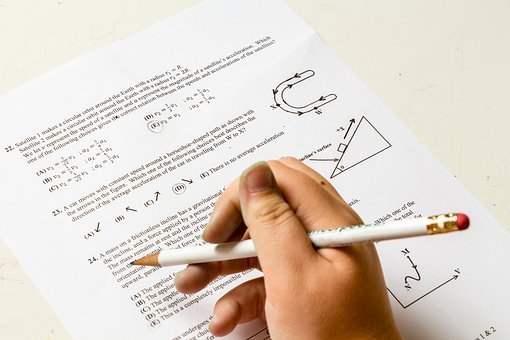Examinations (of any form including practical exercises, short quizzes, etc.) are a test of knowledge for students or individuals under training in a particular endeavor.
An examination can be defined as a formal test involving answering written or oral questions with no or limited access to text-books/materials or the likes of such.

It has been observed that a lot of students fear examinations; some find it difficult to prepare for them or don’t at all; some others prepare for the examinations but depending on the level of preparation, the results may or may not be in line with their expectation.
There are a lot of scenarios in this matter as in most cases, these examinations decide the academic future (perhaps, destiny) of the students; nonetheless, while writing an examination, certain things must be considered. The amount of preparation matters very little here as being careless about these things could lead to serious regret and failure. Students are advised to consider the following:
PAYING ATTENTION TO INSTRUCTIONS
Before an examination begins, instructions are given; in most cases, they are written on the question papers. It is good practice to listen to or read the instructions very carefully till you understand them and can work with them. Make a decision to also follow them. This is really important as many intelligent students have fallen prey to the snare of not keeping to instructions and have paid dearly for it.

Instructions are there to guide us in everything that pertains to that examination. They could be written to aid us know the number of questions to answer (compulsory ones and/or not); they tell us if we are to answer in a specific format; or warnings to be adhered to, etc. it is important to make it a habit of reading instructions first as soon as the exam begins instead of jumping to the questions. You save a lot of time and energy because if you discover later that you are doing the right thing the wrong way, you may be dis-oriented and find it difficult to quickly get back on track.
Research has also shown that brilliant students (students with very good results) all over the world have one thing in common; the ability to follow instructions carefully, to the last detail. This may not necessarily be an inherited trait but a habit that was formed over time, which has become a part of their daily life and yielding good results.
READING THE QUESTION THOROUGHLY
The questions to be answered are also very important here. This does not have to do with the answers to the questions but the nature of the question and understanding what the question says to do. Most questions have certain instructions embedded in them and if ignored, then all may be lost concerning that question. For instance, you are given a list of 25 items to work with and the question says to use items with odd serial numbers (i.e items 1, 3, 5, 7, etc) to provide answers. Most instructions like this could be more subtle and many students miss it especially those who prepared ‘very well’ for the examination as they rush into answering a familiar question without looking at the question thoroughly.

Again, taking sufficient time to study the question saves you time and energy among other things. Here, your ability to identify and follow instructions also comes to play.
GIVING THE CORRECT RESPONSE
This is where the benefits of preparation come in. After understanding the instructions as well as the questions, you have to provide suitable answers that determine your score. Here, speed, accuracy and order are very important tools you need to work with. Of course, if you had this in mind while preparing, it won’t be much of a problem. You need speed because in any well set examination, the time to answer a question is limited. For those who may be slow in figuring out what the question says, you need more speed once you do. Even as you speedily answer the question, it is good practice to keep your work very organized. It just doesn’t aid in marking or give extra scores for organization; it also helps you keep track of how much work you have done and aids in quick recovery if by any chance you got distracted in the course of the examination. Most importantly, it aids in your accuracy which is a very important tool.

As much as you understand and try to finish neatly and quickly, if your answers are wrong, they are wrong and nothing can be done to change that. Thus an organized work gives you a clear view of your work and helps you flow along accurately especially when you know what you are doing well enough. You also spot errors quickly and make necessary corrections with ease.
Giving the correct response depends on how well you understood the question and whether or not you followed certain instructions.
Note that preparing for an examination goes beyond reading and studying; you also have to put yourself under exam conditions while practicing how to attain the best possible score under these conditions. You could ask for help in getting this done. All these will be explained in the next post on what to do before an examination.
Please stay tuned!!!
Photo credit: pixabay